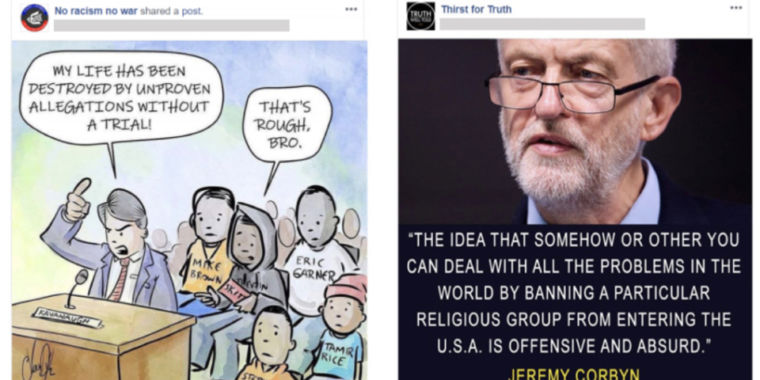
-
Images posted by accounts identified as being part of an Iranian influence campaign via Facebook and Instagram accounts.
-
More images posted by accounts identified as being part of an Iranian influence campaign via Facebook and Instagram accounts.
-
Images posted by accounts identified as being part of an Iranian influence campaign via Facebook and Instagram accounts. (There’s a theme to this gallery.)
Facebook
-
One final batch of images posted by accounts identified as being part of an Iranian influence campaign via Facebook and Instagram accounts.
Today, Facebook took down 30 pages, 33 Facebook accounts, three Facebook groups, and 16 Instagram accounts that Facebook’s head of Cybersecurity Policy Nathaniel Gleicher said were tied to an influence campaign by a group of actors in Iran.
“It’s still early days, and while we have found no ties to the Iranian government, we can’t say for sure who is responsible,” Gleicher said in a call with press this afternoon. He added that Facebook found some overlap in the accounts’ activity with a group of Iran-linked accounts taken down by the company in August. “Given the elections, we took action as soon as we’d completed our initial investigation and shared the information with US and UK government officials, US law enforcement, Congress, other technology companies, and the Atlantic Council’s Digital Forensic Research Lab,” Gleicher said. He added that Facebook shared information not just with federal officials but with state and local election officials as well to keep them advised of any emerging threat.
The accounts, pages, and groups had approximately 1.02 million combined followers across Facebook and Instagram. While the accounts and pages associated with the latest takedown were created as early as 2016, most of their activity occurred over the past year. That includes a very small Facebook ad buy—two advertisements, for under $100 US, purchased in US and Canadian currency—as well as seven events hosted by the pages. Details of the events have not yet been shared by Facebook.
Facebook did not take down the accounts and pages for their content but rather because of “inauthentic behavior.” The accounts and group and page administrators had represented themselves as US and British citizens. Like other influence campaigns recently exposed, the content posted by the accounts and pages was targeted “at spreading discord,” as Gleicher described it—focusing on hot-button issues such “race relations, certain political leaders, and immigration.”
This is consistent with content posted by Iranian actors taken down by Facebook in August, and with posts on Twitter identified as being part of an Iranian influence campaign dating back to 2014. But unlike recent Russian influence campaigns, the Iranian actors focused on promoting sentiments and activities that tended to be in opposition to President Trump (and in some cases, UK prime minister Theresa May).
Data released by Twitter last week showed Iranian actors posted hundreds of times with the #BlackLivesMatter hashtag, for example, and they posted over 30,000 anti-Trump tweets through the accounts Berniecrats, RiseAgainstTheRight, and RealProgressiveFront.
Gleicher said that Facebook was still trying to work out the best way to widely release data on the influence campaigns to researchers, but Facebook’s immediate priorities were to “rapidly disrupt behavior, involve law enforcement, and to inform the public.” Aside from other Internet companies, the only researchers to have access to the data so far have been with the Atlantic Council’s Digital Forensic Research Lab, which has done considerable research on both Russian and Iranian influence campaigns. The Atlantic Council is a policy think-tank that “promotes constructive leadership and engagement in international affairs based on the Atlantic Community’s central role in meeting global challenges” (which, it should be noted, counts the United Arab Emirates, the UK’s Foreign & Commonwealth Office, Lebanese-Saudi billionaire Bahaa Hariri, and a number of defense contractors among its largest supporters).
Facebook has set up a “war room” to handle potential threats such as this influence campaign in the run-up to the US midterm elections. That initiative pulls together 20 teams that have conducted investigations into various threats, as well as others at Facebook who have worked on stopping “inauthentic” campaigns surrounding other countries’ recent elections. Gleicher said that Facebook is using a combination of machine learning and human investigators to more rapidly identify and clamp down on inauthentic behavior. For example, he said that teams at Facebook had been able to shut down an emerging hate speech campaign connected to recent Brazilian elections within hours.
Listing image by Facebook
Be the first to comment